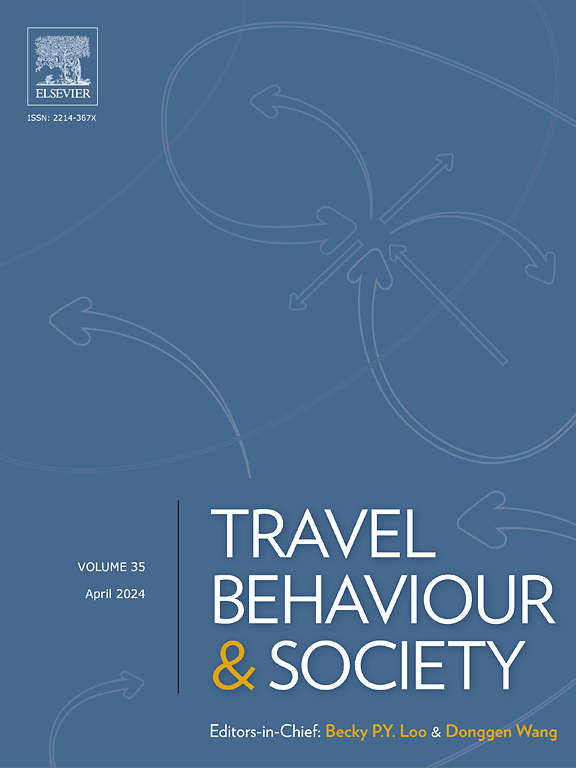Did the bumper sticker piss you off? The mediating roles of blame judgement and negative emotion between slogans and aggressive driving behaviour
IF 5.7
2区 工程技术
Q1 TRANSPORTATION
引用次数: 0
Abstract
With growth in the quantity of vehicles in China, diverse bumper sticker slogans have become a common sight on roads. Bumper sticker slogans are likely to affect the responses of surrounding drivers, but little is known about the underlying mechanism involved. The aims of this study were to explore the effects of bumper sticker slogans on blame judgement, negative emotion and aggressive driving behaviour and to test the mediating roles of blame judgement and negative emotion between bumper sticker slogans and aggressive driving behaviour. We adopted a single-factor design in which bumper sticker slogans were a within-subject factor with two levels: provocative and conciliatory slogans. The participants were asked to imagine five irritating driving scenarios while viewing different slogans and to respond to items measuring other variables. Finally, a total of 233 valid questionnaires were received. The results showed that compared with conciliatory slogans, provocative slogans received higher scores for blame judgement, negative emotion and aggressive driving behaviour. Moreover, both blame judgement and negative emotion played mediating roles between bumper sticker slogans and aggressive driving behaviour, and they had a joint mediating effect, indicating that bumper sticker slogans affected aggressive driving behaviour by increasing blame judgement and negative emotion. This study explores the mechanism by which bumper sticker slogans affect aggressive driving behaviour and provides insights for the future design of bumper sticker slogans and for drivers’ selection of appropriate bumper sticker slogans.
保险杠贴纸惹毛你了吗?指责判断和负性情绪在口号与攻击性驾驶行为之间的中介作用
随着中国汽车数量的增长,各种各样的保险杠贴纸标语已经成为道路上常见的景象。汽车保险杠上的标语可能会影响周围司机的反应,但人们对其中的潜在机制知之甚少。本研究旨在探讨汽车保险杠贴纸标语对肇事司机责任判断、负性情绪和攻击性驾驶行为的影响,并检验肇事司机责任判断和负性情绪在肇事司机汽车保险杠贴纸标语与攻击性驾驶行为之间的中介作用。我们采用了单因素设计,其中保险杠贴纸标语是一个具有两个层次的主题内因素:挑衅和和解口号。参与者被要求在观看不同的标语时想象五种令人恼火的驾驶场景,并对测量其他变量的项目做出反应。最终,共收到有效问卷233份。结果表明,与和解性口号相比,挑衅性口号在指责判断、负面情绪和攻击性驾驶行为方面得分更高。此外,指责判断和负性情绪在汽车贴纸标语与攻击性驾驶行为之间均起中介作用,并具有联合中介效应,说明汽车贴纸标语通过增加指责判断和负性情绪影响攻击性驾驶行为。本研究探讨了汽车保险杠贴纸标语影响攻击性驾驶行为的机制,为未来汽车保险杠贴纸标语的设计和司机选择合适的汽车保险杠贴纸标语提供了见解。
本文章由计算机程序翻译,如有差异,请以英文原文为准。
求助全文
约1分钟内获得全文
求助全文
来源期刊

Travel Behaviour and Society
TRANSPORTATION-
CiteScore
9.80
自引率
7.70%
发文量
109
期刊介绍:
Travel Behaviour and Society is an interdisciplinary journal publishing high-quality original papers which report leading edge research in theories, methodologies and applications concerning transportation issues and challenges which involve the social and spatial dimensions. In particular, it provides a discussion forum for major research in travel behaviour, transportation infrastructure, transportation and environmental issues, mobility and social sustainability, transportation geographic information systems (TGIS), transportation and quality of life, transportation data collection and analysis, etc.
 求助内容:
求助内容: 应助结果提醒方式:
应助结果提醒方式:


